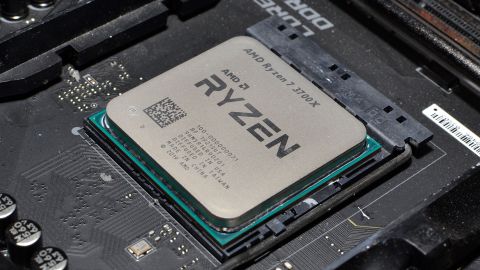Our Verdict
The Ryzen 7 3700X doesn't dazzle with a dozen cores, but it's still an impressive CPU. It's the sensible choice when compared with the more extreme 3900X.
For
- Efficient and fast
- PCIe Gen4 and 7nm
- Relatively affordable
Against
- Slightly slower in games
- Limited overclocking potential
- Is the firmware done yet?
PC Gamer's got your back
AMD's third-generation Ryzen CPUs boast higher clockspeeds and more cores than the previous first and second gen parts, and the Ryzen 7 3700X is now one of the best CPUs for gaming. Zen 2 CPUs are so good that AMD almost doesn't need the faster offerings. Its second-string 3700X is perfectly capable of running the offense, and it isn't quite as demanding when it comes to signing bonuses and contracts. For those teams (aka PCs) with salary cap concerns that can't quite justify chasing the 3900X, the 3700X is a versatile QB that can throw a quick short pass, scamper downfield for a modest gain, or even launch the long ball when occasion requires.
When it comes to playing football—running PC games—there's not a huge difference between the 3700X and the 3900X. In fact, there's hardly any difference at all. For gaming, the 3700X and 3900X are effectively tied, and you can safely ignore the barely faster 3800X. It's 1-4 percent better (according to tests at Tom's Hardware) for the extra $70. But I'm jumping ahead.
Here's what the specs on AMD's 2nd and 3rd gen Ryzen parts look like:
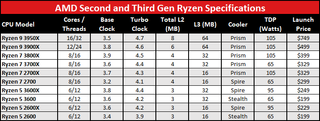
Maximum boost clocks on the 3800X are only 100MHz higher than the 3700X, but minimum 'guaranteed' clocks are potentially 300MHz higher. In practice, however, the 3700X mostly runs well above the minimum clockspeed, particularly in light to medium workloads. If you do a lot of 3D rendering or video encoding, moving to the Ryzen 9 3900X makes sense, but for everyone else the 3700X is a great choice. Alternatively, the previous gen AMD parts are now priced to move—the Ryzen 7 2700X regularly sells for $220 or less.
I've covered the architectural updates in detail elsewhere (Ryzen 3000 and Zen 2 architectural updates), so I'm not going to rehash that here. Basically, Zen 2 is better, smaller, and faster than Zen+ and the original Zen architectures. How much faster? That depends on what you're doing, so let's get to the benchmarks.
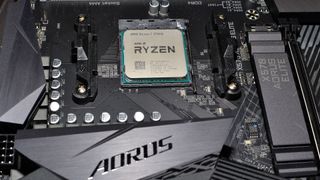
All of the benchmarks that follow were done running the latest Windows 10 May 2019 update, with updated drivers and BIOS firmware. Unlike some other sites (and I'm not faulting their testing protocols. It's just not how I do things), all CPUs are tested with high speed DDR4-3200 CL14 memory, with XMP memory profiles enabled. That's sort of overclocking, and potentially helps AMD CPUs more than Intel chips, but this is the lightest/easiest form of overclocking around and all modern CPUs have easily handled the higher memory speeds. Every PC is on equal footing as much as possible, in other words.
As with other Ryzen CPUs, I didn't do extensive overclocking tests on the Ryzen 7 3700X. That's because it generally doesn't help much. You sacrifice boost clocks for higher all-core clocks, though with the 3700X there's at least a bit more gain from enabling Precision Boost Overdrive. It's still only 200MHz extra at best, which means less than a 5 percent improvement, and often in the 1-3 percent range. The days of massive gains via overclocking your CPU are largely behind us now. Intel's Core i9-9900K might get an extra 400MHz vs. stock, and AMD's CPUs might get an extra 200-300MHz, which just isn't that exciting. It's the blessing and curse of increased competition.
All of AMD's third-gen parts were tested in the MSI MEG X570 Godlike board (with similar results from Asus and Gigabyte boards). Besides the memory, I used a Gigabyte Aorus NVMe Gen4 2TB SSD for the main drive (another part of the AMD review kit), with a GeForce RTX 2080 Ti Founders Edition graphics card.
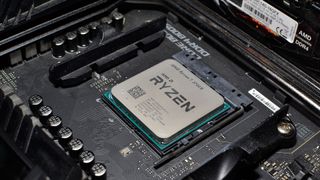
Ryzen 7 3700X gaming performance
Starting with gaming performance, here's how the Ryzen 7 3700X stacks up. All ten games are tested at 1080p 'ultra' (generally the highest possible settings, outside of super-sample anti-aliasing), and each test is run multiple times to ensure the consistency of results. Minimum fps is calculated as the average fps for the bottom three percent of frametimes—find the 97 percentile frametime, and sum up all frametimes above that, dividing by the number of frames. This provides a more useful metric than pure minimum fps or pure 97 percentile.






















Out of ten games tested, the 3700X and 3900X are pretty much tied, with the 3900X hanging on to a scant 0.5 percent lead in framerates. That's well within margin of error, and that's with an RTX 2080 Ti at 1080p; move up to 1440p or 4K, or downgrade to a slower GPU, and the gap would almost completely disappear.
What about Intel and its Core i7-9700K and Core i9-9900K? The 9700K actually tops the overall gaming performance chart—yup, Hyper-Threading isn't always beneficial for games. That makes the 9700K 10 percent than the 3700X, while the 9900K is 9 percent faster. Of course, that's when running games at 1080p with the fastest current GPU available. The gap would be substantially smaller at 1440p and basically non-existent at 4K.
In other words, like the 3900X, AMD can't lay claim to the gaming performance crown and in fact comes in behind even the older i7-7700K, depending on the game. If gaming is your number one priority, you're still better off with an Intel CPU (never mind the various security exploits that have been patched over the past 18 months).
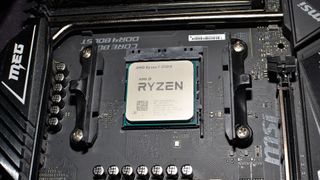
Ryzen 7 3700X application performance
Hit the showers and leave the field of games behind, and differences between the 9700K and 3700X swap places. Thanks to the extra threads available via SMT, the 3700X is about 18 percent faster than the 9700K in multithreaded workloads. Include all of the benchmarks and it's about a 7 percent lead for AMD overall—and at a lower price, since you'd still need an aftermarket cooler with the 9700K.






















As I discussed in the 3900X review, it's important to remember what these CPU benchmarks really mean. 3D rendering and y-cruncher are great tools for using all possible CPU resources. They're also tools that the vast majority of people will never use (3D rendering in particular). Video encoding at least has some bearing on streaming performance, though I still think amateur streamers are better off using GPU encoding, and pro streamers should have a dedicated streaming PC.
The Zen 2 architectural updates are definitely a factor in CPU performance, and TSMC's 7nm process gives AMD a manufacturing lead over Intel for the first time in... ever. Look no further than power use, where the 3700X topped out at 179W for heavily multithreaded workloads compared to the 9900K's 242W, or the 9700K's 208W. Intel's 10nm node is now shipping, and may ultimately prove similar or perhaps even superior to TSMC's 7nm, but it's only in laptop parts and that doesn't look set to change any time soon. Instead, rumors are that future 10th Gen 14nm Comet Lake Intel processors will keep Intel's desktop playoff hopes alive. Which feels incredibly weird, but whatever.
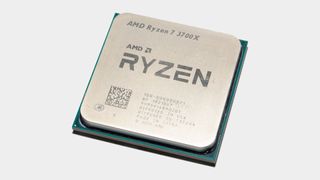
Ryzen 7 3700X is an impressive CPU
AMD's Ryzen processors continue to put the pressure on Intel, forcing increasingly potent CPUs into mainstream pricing. With third generation Ryzen, AMD effectively sounds the death-knell for HEDT platforms. I still love the idea of extreme performance, and the 56-core and 64-core server chips are cool, but I certainly don't need them in my home PC. Frankly, with chips like the Ryzen 9 3900X, I don't need any of the HEDT processors from Intel or AMD. When you can get a great 8-core chip for $329, and 12-core chips for $499, why bother with a more expensive motherboard, memory, CPU, and PSU?
Ryzen 7 3700X is a great CPU overall, and it's arguably the sensible choice for most users. Why blow a ton of cash on your CPU and then have to cut back on your graphics card, storage, motherboard, and/or memory? Bang for the buck is always better if you step down a notch or two from the top-of-the-line parts. Raw performance is nice, but the balanced approach is often better. There's nothing wrong with backing off a bit and getting a slightly less potent part at a far more reasonable price.
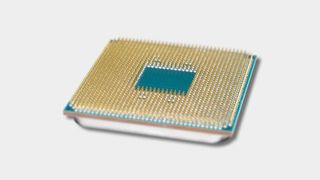
There are really only two potential concerns with the Ryzen 7 3700X. First, if you are planning on buying a top-tier GPU like the RTX 2080 Ti or RTX 2080 Super, and if you're shooting for 144fps, Intel CPUs still win out in gaming performance. It varies by game, but at 1080p ultra I've measured up to a 30 percent difference in framerates, and even at 1440p high can still favor faster CPUs.
Second, overclocking of the latest AMD and Intel CPUs is becoming severely limited. On Intel, you can at least play with individual core multipliers, so maybe 5.0GHz on all cores, and 5.2GHz on 1/2-core loads. If you manually overclock an AMD chip, it's one multiplier, period. So you might lose singlethreaded performance for a slight gain in multithreaded performance. PBO (Precision Boost Overdrive) allows the CPU to exceed the default clockspeeds depending on thermals, though you'll generally want liquid cooling and still only get an extra 200MHz at most.
And just to be clear, neither of those drawbacks are insurmountable problems.
Anyone looking at building an AMD based PC will find a lot to like with the Ryzen 7 3700X. It's basically as fast as the more expensive third gen Ryzen parts when it comes to gaming, and certainly fast enough for most other tasks. It's also about 10 percent faster than the previous generation Ryzen 7 2700X in gaming performance, and 15 percent faster overall. And it might improve even a bit more if AMD and its partners ever get the firmware and turbo stuff sorted out.
The Ryzen 7 3700X doesn't dazzle with a dozen cores, but it's still an impressive CPU. It's the sensible choice when compared with the more extreme 3900X.
Jarred's love of computers dates back to the dark ages when his dad brought home a DOS 2.3 PC and he left his C-64 behind. He eventually built his first custom PC in 1990 with a 286 12MHz, only to discover it was already woefully outdated when Wing Commander was released a few months later. He holds a BS in Computer Science from Brigham Young University and has been working as a tech journalist since 2004, writing for AnandTech, Maximum PC, and PC Gamer. From the first S3 Virge '3D decelerators' to today's GPUs, Jarred keeps up with all the latest graphics trends and is the one to ask about game performance.

Turns out that Balatro, like Tetris before it, can only be 'finished' by scoring so high it crashes the game

Google being pushed to sell off Chrome is likely a good thing, but don't cheer on the decision just yet

Out of all the new PC hardware in 2024, my top choice is technically over two years old. Even though it was new
